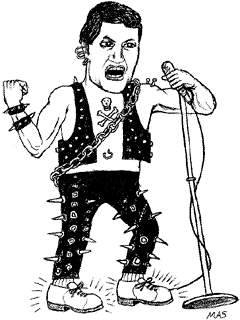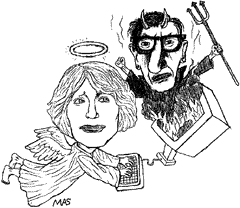
CD
Pat Boone in a Metal Mood: No More Mr. Nice Guy, by Pat Boone (Hip-O Records). The born-again Christian crooner ("Elvis without the pelvis") reinvents himself as a heavy-metal rocker, recording covers of songs from Judas Priest, AC/DC, and Metallica. Reviewers are skeptical. "What's Boone up to? Same as always, shoplifting other folk's style and music," says Newsday's Les Payne--only this time, "this professional Christian" is borrowing from "the same [musicians he] denounced a few years back as the sons and warlocks of Satan." The Chicago Tribune's Michael Killian calls him "a traitor to his epoch, the Benedict Arnold of Bucks and Button-Down." (Listen to Pat Boone in his metal mood on No More Mr. Nice Guy's official page.)
Movies
Dante's Peak (Universal Pictures). Volcano chic, Part One (Part Two, Volcano, opens in April). Dante's Peak gives movie critics an occasion to reaffirm a movie-critic's article of faith: the efficacy of generic formulas and special effects, trite though they may be. "Disaster movies are our millennial No plays, totally stylized, totally predictable, but comforting in their familiarity" (Richard Schickel, Time). "The movie ... has a visual energy all its own--a blizzard of boulders, the village blanketed with mauve ash, a bridge cracking apart and dumping its cargo of cars into a river" (Joe Morgenstern, the Wall Street Journal). "The stupid thing gets the job done" (David Denby, New York). Critics interpret the sudden outcropping of natural-disaster movies as nostalgia for the '70s and films such as The Poseidon Adventure and Jaws, "some of whose plot elements have been recycled here," says Denby. Pierce Brosnan wins praise for adding a personality to his picture-perfect features. (Stills, clips, and the like are available on the Dante's Peak site.)
When We Were Kings (Gramercy Pictures). High praise for director Leon Gast's debut documentary about the "Rumble in the Jungle," the 1974 Muhammad Ali vs. George Foreman championship bout fought in Zaire. High praise for Ali, too: "[H]is charisma makes the film" (Richard Corliss, Time). The film's highlights: on-screen commentary from ringside spectators Norman Mailer and George Plimpton, music by James Brown and B.B. King, and displays of eloquence from Ali ("Only last week I murdered a rock, Injured a stone, Hospitalized a brick. I'm so mean I make medicine sick.") "So now we know," writes TheNew Yorker's Anthony Lane. "Among his many other accomplishments, Muhammad Ali invented rap." (Clips of Ali preparing for the "Rumble in the Jungle" and a Mailer bio are available on the When We Were Kings page.)
Prisoner of the Mountains (Orion Classics). Veteran Soviet-era director Sergei Bodrov transposes a Tolstoy short story about Russian soldiers held by Muslim foes to present-day Chechnya. Reviews praise the film's mordant humor and cinematography (mostly rugged mountain vistas). The Wall Street Journal's Morgenstern says it is "unexpectedly affecting, a tragicomedy about ordinary guys who might have been GIs caught up in Vietnam, or Bill Maudlin's Willie and Joe in World War II." The New Republic's Stanley Kauffmann says, "Bodrov's entire film is, to put it musically, like a set of appealing variations on an old, simpler theme."

Books
What Falls Away: A Memoir, by Mia Farrow (Nan A. Talese/Doubleday). Woody Allen's rehabilitation suffers a setback. Ex-girlfriend Farrow levels some familiar charges (Allen put his face in the lap of their 8-year-old daughter, Dylan, and kept pornographic Polaroids of Soon Yi) but adds instances of pettier meanness (he lashed out at Farrow when she invited him to her son's sixth-grade graduation). Most critics find Farrow credible. In Newsweek, novelist Jacquelyn Mitchard says the elegance of Farrow's prose exonerates her of the charge that she is crazy. Time's Martha Duffy compares the memoir to Katharine Graham's. Like Graham, Farrow "questions her own passivity in dealing with men and blames herself." But People's Carol Sarler argues that writing the book constitutes child abuse, in a way: "[T]here are forms of abuse other than the violent or the sexual. And one of them is hanging your children's privacy out to dry when you have a book to sell." (See Doubleday's plug for the book.)
Before the Dawn: An Autobiography, by Gerry Adams (William Morrow and Co.). No bloody details stain this memoir by the leader of Sinn Fein (the Irish Republican Army's political wing). Reviewers view Adams' decision to remain opaque as a political necessity. Admitting to an active part in IRA violence would have landed him in jail. But since Adams opted instead to write a diatribe against the British occupation of Northern Ireland, critics dismiss the book as a facile rant. Writing in the Weekly Standard, Stuart Reid, an editor of the Daily Telegraph, a conservative British paper, says that Adams' political reinterpretation of his past "is so transparent as to make you turn away in watery-eyed embarrassment."
A Supposedly Fun Thing I'll Never Do Again: Essays and Arguments, by David Foster Wallace (Little, Brown and Co.). Essays on pop culture, literature, tennis, and Middle America from the author of the epic and epically hyped Infinite Jest (1996). Reviewers note that the essays, like the book, are long (97 pages about a cruise-ship voyage, 54 on the Illinois State Fair) and playful ("He trounces words; he pivots on commas; he drops in and out of styles like a vaudevillian who lets the audience watch him change costumes right there on stage," says the Los Angeles Times' Susan Salter Reynolds). The question: Is Wallace a postmodern ironist, sarcastic to the point of annoyance? Or is there seriousness underneath the mordancy? In Newsday, James Wood optimistically proposes the latter: "One feels behind the postmodernism an old realist modernist grinding away, eager to notate reality (though in funky ways)." (Click here for more on the book.)
Television
The Chris Rock Show (HBO, Friday nights at 12:30 EST and PST; 11:30 CST). Critics say the new late-night talk show by young black comedian Chris Rock (Saturday Night Live, voice of Li'l Penny in Nike ads) succeeds because of its risky racial humor. (He says his show "will be close-captioned for the ebonically impaired.") "Rock goes beyond Eddie [Murphy], beyond liberal guilt. He makes equally scathing fun of white people and black people," says Newsweek's Rick Marin. Other reviews compare him to Lenny Bruce and Richard Pryor. He "is probably the funniest and smartest comedian working today," says the New York Times' Caryn James. (HBO plugs The Chris Rock Show.)
Updates
In the New Republic, Nicholas Lemann reads Dick Morris' book, Behind the Oval Office: Winning the Presidency in the Nineties, as the tragic tale of a triangle of unrequited love. The players are Clinton (the object of desire), Morris (the mistress), and the Democratic Party (the wronged wife): "She doesn't understand her man, she can't fulfill his deepest desire (to get re-elected), she will inevitably drag him down. And yet she functions as his official consort. Morris, by contrast, when he wishes to be alone with his loved one, must come in through the back door (the East Wing), alone, at night, passionately but illicitly."
Recent "Summary Judgment" columns:
Book--Personal History, by Katharine Graham;
Book--What It Means to Be a Libertarian: A Personal Interpretation, by Charles Murray;
Book--Do the Windows Open?, by Julie Hecht;
Movie--Gridlock'd;
Movie--Waiting for Guffman;
Art--"Willem de Kooning: The Late Paintings, the 1980s";
Theater--Men Are From Mars, Women Are From Venus;
Event--"On Cultural Power: The Wilson-Brustein Discussion."
Art--"Giambattista Tiepolo, 1696-1770";
Event--Halftime at Super Bowl XXXI;
Movie--Kolya;
Book--Island of the Colorblind, by Oliver Sacks;
Theater--The Steward of Christendom;
Movie--Fierce Creatures;
Book--Le Divorce, by Diane Johnson.
Book--Behind the Oval Office: Winning the Presidency in the Nineties, by Dick Morris;
Movie--The Whole Wide World;
Event--The Inauguration of William Jefferson Clinton;
Book--One World, Ready or Not: The Manic Logic of Global Capitalism, by William B. Greider;
CD--Idomeneo, by Wolfgang Amadeus Mozart, performed by Placido Domingo and the Metropolitan Opera Orchestra and Chorus, conducted by James Levine;
Movie--Albino Alligator;
Television--The Naked Truth.
Movie--La Cérémonie;
Book--The Prospect Before Her: A History of Women in Western Europe, 1500-1800, by Olwen Hufton;
Television--King of the Hill;
Architecture--Tokyo International Forum.
--Compiled by Franklin Foer and the editors of Slate.
